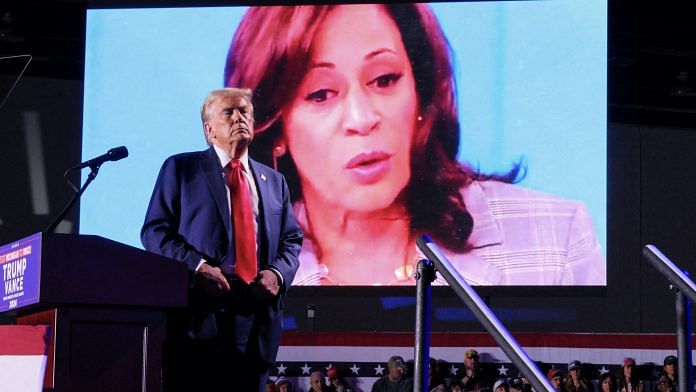China has closely monitored the 2024 US presidential election, recognising the inevitable impact it will have on China-US relations.
With over three million posts on Weibo and widespread discussions on Chinese search engines and news websites, the election has dominated Chinese media and online discourse, underscoring its significance to China and the close attention it draws from Chinese policymakers and internet users alike.
With the voting done, all eyes in China, like elsewhere, are now set on the results.
Election dynamics
Several articles and posts anticipated Democrat Kamala Harris’s electoral victory, highlighting an interesting contrast between global and domestic support for her and Republican Donald Trump. For example, outside the US, many internet users and some heads of state, particularly Hungarian President Viktor Orbán, have expressed support for Trump over Harris. Domestically, however, Harris appears to enjoy broader support, possibly influenced by perceptions of Trump’s persona as overly theatrical, while Harris is seen as a dedicated politician capable of guiding the US towards economic recovery.
Democracies and elections can be messy. The current US election exemplifies the complexities of democratic processes, and Chinese discourse highlights this reality with notable scrutiny. This scrutiny is heightened by the stark contrast between the US election’s unpredictable dynamics and China’s governance model. Images of American shop owners barricading their businesses in anticipation of potential unrest have circulated widely, reinforcing China’s view of the vulnerabilities of democratic systems. Many commentators in China see this election as one of the most dramatic yet, particularly given events like the attempted assassination of Trump and the euthanasia of the celebrity squirrel, Peanut.
Observers in China also view this election as an extraordinary milestone—either the election of the first female US president or the potential return of a convicted former president to the White House. Trump’s popularity has sparked strong reactions. As Beijing-based scholar Wang Mengqiao, from the University of International Business and Economics, notes, this phenomenon is tied to the rise of identity politics in America. “Identity politics now overshadow governance skills in US elections, with voters prioritising candidates whose experiences resonate with them personally,” Wang writes.
Also read: US-China rivalry not the same as US-Soviet. What India needs to watch out for
Impact on US-China relations
Despite the intense electoral competition, Chinese analysts see little variation in the candidates’ respective stances on China. They observe a shared view in Washington that China remains a principal adversary, suggesting that fundamental shifts in China-US policy are unlikely, irrespective of the election outcome. Caixin, a major Chinese media outlet, underscores this by noting, “A bipartisan consensus has taken shape in Washington: whether it’s Vice President Harris or former President Trump, the strategic rivalry between Beijing and Washington is set to intensify.”
In Chinese discourse, neither candidate’s victory is viewed as beneficial to China, given the bipartisan alignment on a hardline stance. The Democratic Party is perceived as ideologically driven, unifying Western nations against China and framing it as a strategic adversary. Trump, however, is viewed as a more unpredictable figure, whose business-first and “Make America Great Again” approaches triggered a trade war that directly harmed the Chinese economy. Jin Canrong, a professor at the School of International Relations at Renmin University, suggests that while ideological elements may become stronger in the US’s outlook toward China, the continuity of past practices will persist, with policies such as strengthening alliances and collective approaches to containing China.
Trump’s unpredictability, however, presents distinct challenges. His disruption of diplomatic norms complicates China’s strategic calculations, creating risks for companies like Huawei. Huang Jing, from Shanghai Foreign Studies University, noted that Trump’s return to office would likely escalate these tensions, further constraining Chinese businesses. Conversely, Harris’s potential victory signals a continuation of policies laid out by US President Joe Biden during the San Francisco summit with Chinese President Xi Jinping, potentially bringing a semblance of stability to bilateral relations.
A shared perspective within US politics—containing China’s rise—marks a rare bipartisan agreement that China expects to shape future relations. In this context, some Chinese commentators view Harris as a potentially less adversarial figure, particularly given the familiarity with the Biden administration and the Democrats’ willingness to engage China. Nonetheless, there is a strong consensus in China that the China-US rivalry will continue unabated, regardless of who occupies the White House.
Ultimately, Chinese discourse on the US election reflects a clear-eyed view of the challenges ahead, both old and new. Analysts and policymakers recognise that while the style of engagement and confrontation may vary, the strategic trajectory of China-US relations will remain fundamentally adversarial, with China preparing for sustained rivalry and little expectation of relief.
Sana Hashmi is a fellow at Taiwan-Asia Exchange Foundation. She tweets @sanahashmi1. Views are personal.
(Edited by Prashant)





